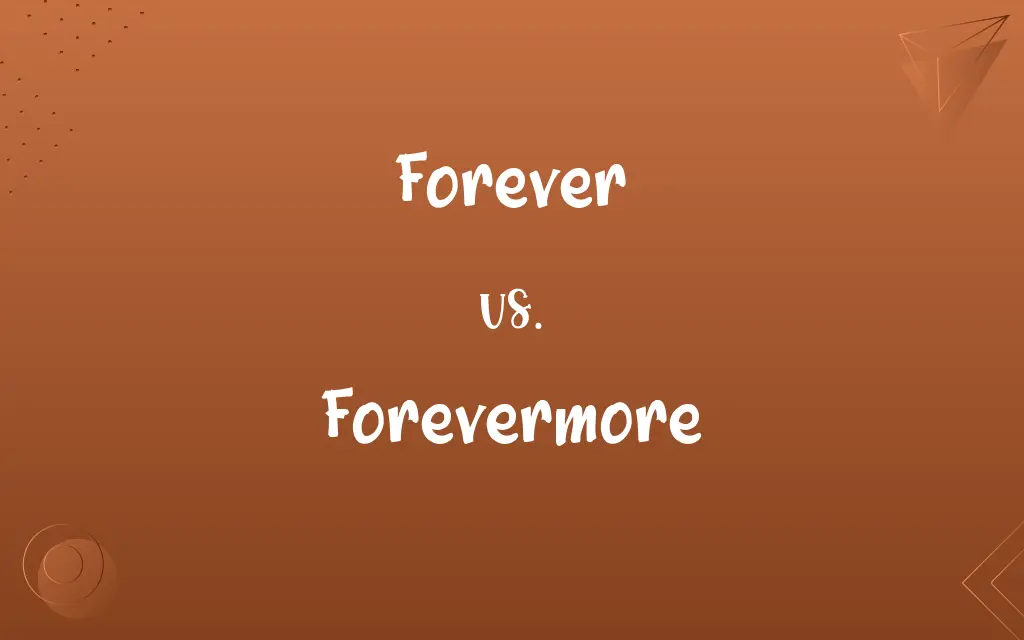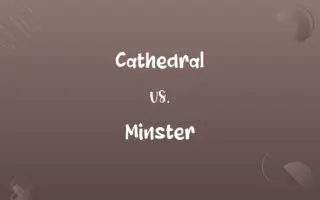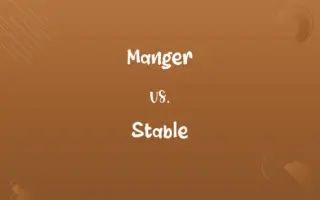Forever vs. Forevermore: Know the Difference

By Shumaila Saeed & Hifza Nasir || Updated on March 5, 2024
Forever signifies endless time, focusing on continuity; forevermore adds emphasis, suggesting continuation from a specific point onwards.

Key Differences
Forever is used to express an infinite duration without end, often emphasizing the timeless or eternal nature of something. It's a concept that stretches across all contexts, from promises of love to the enduring qualities of an idea. Whereas forevermore is a term that builds upon the idea of forever, offering an additional nuance that implies "from this moment forward." It's used to stress the commencement of the endless duration, marking a specific point in time as the origin of the perpetual continuity.
Shumaila Saeed
Mar 05, 2024
In literature, forever captures the essence of eternity in a broad sense, enriching narratives with a sense of timelessness. Poets and authors use it to convey enduring truths or promises that are not bounded by time. On the other hand, forevermore is employed to add a dramatic flourish, often concluding promises or declarations with a sense of starting now and lasting eternally. This distinction allows writers to play with temporal nuances, crafting moments of significant change or commitment.
Shumaila Saeed
Mar 05, 2024
In everyday language, forever is a common term used to describe any long-lasting or seemingly endless period. People might say, "I could wait forever," to express patience or exaggeration about waiting. Whereas forevermore, though less commonly used in casual conversation, appears in more formal or poetic contexts, offering a sense of solemnity to the commitment being expressed, such as in wedding vows or in literary works.
Shumaila Saeed
Mar 05, 2024
When it comes to emotional expressions, saying "I will love you forever" is a common declaration of endless affection. This statement emphasizes the timeless aspect of one's feelings. Whereas declaring "I will love you forevermore" adds an element of starting now and continuing indefinitely, often used to underscore a pivotal moment or a deepening of commitment.
Shumaila Saeed
Mar 05, 2024
In philosophical or speculative discussions, forever invites contemplation of the infinite, encouraging a broad exploration of concepts that have no end. It's a term that invites open-ended discussions about the universe, life, and the abstract. Forevermore, however, prompts a more focused reflection, considering the future from a specific point in time onwards, thus framing discussions around the idea of perpetual continuity with a beginning in the now.
Hifza Nasir
Mar 05, 2024
ADVERTISEMENT
Comparison Chart
Definition
Expressing time with no end
Expressing time continuing from a specific point onwards with no end
Shumaila Saeed
Mar 05, 2024
Usage in Language
Common in everyday and emotional expressions
More formal or poetic, used for emphasis
Hifza Nasir
Mar 05, 2024
Temporal Focus
General concept of endless time
Specific start point with endless continuation
Shumaila Saeed
Mar 05, 2024
Common Contexts
Promises, descriptions of enduring qualities
Formal declarations, literary works
Hifza Nasir
Mar 05, 2024
Emotional Implication
Often denotes a timeless or eternal nature
Implies a commitment beginning now and lasting indefinitely
Shumaila Saeed
Mar 05, 2024
ADVERTISEMENT
Forever and Forevermore Definitions
Forever
Lasting for an infinite amount of time.
Their love seemed to last forever.
Hifza Nasir
Mar 05, 2024
Forevermore
Used to emphasize the future continuation of a current state.
He decided to change his ways forevermore.
Shumaila Saeed
Mar 05, 2024
Forever
In a manner that continues indefinitely.
He's changed forever after the incident.
Hifza Nasir
Mar 05, 2024
Forevermore
As a solemn promise of indefinite duration from a point in time.
From today, peace shall reign forevermore.
Hifza Nasir
Mar 05, 2024
Forever
Used to emphasize a long period.
It took forever to finish the project.
Shumaila Saeed
Mar 05, 2024
ADVERTISEMENT
Forevermore
In a literary or formal context, suggesting an eternal continuation.
She entered the legend, to be celebrated forevermore.
Shumaila Saeed
Mar 05, 2024
Forever
Expressing a never-ending condition.
This winter feels like it's lasting forever.
Shumaila Saeed
Mar 05, 2024
Forevermore
From this moment onward for an infinite amount of time.
I vow to love you forevermore.
Shumaila Saeed
Mar 05, 2024
Forever
Hyperbolically, to describe any lengthy duration.
We've been waiting here forever.
Dua Fatima
Mar 05, 2024
Forevermore
Indicating a perpetual state beginning now.
This day will be remembered forevermore.
Shumaila Saeed
Mar 05, 2024
Forever
For a very long time, a seeming eternity.
We had to wait forever to get inside.
That was forever ago.
Shumaila Saeed
Oct 19, 2023
Forevermore
At any future time; in the future;
Lead a blameless life evermore
Shumaila Saeed
Oct 19, 2023
Forever
A seemingly very long time
It has taken forever to resolve these problems.
Shumaila Saeed
Oct 19, 2023
Forever
(duration) For all time, for all eternity; for a lifetime; for an infinite amount of time.
I shall love you forever.
Shumaila Saeed
Oct 19, 2023
Repeatedly Asked Queries
Is "forevermore" a formal term?
Yes, forevermore tends to be more formal or poetic, used especially for dramatic effect or in solemn promises.
Shumaila Saeed
Mar 05, 2024
Is "forever" common in everyday language?
Yes, it's widely used in various contexts, from casual conversations to literary expressions.
Shumaila Saeed
Mar 05, 2024
What does "forever" imply?
Forever implies an indefinite period without end, often used to describe timelessness or eternal states.
Shumaila Saeed
Mar 05, 2024
Can "forever" express hyperbole?
Yes, it's often used hyperbolically to describe very long durations, not always literally endless.
Shumaila Saeed
Mar 05, 2024
Can "forever" be used to describe conditions or states?
Yes, it can describe conditions, states, or emotions that are perceived as never-ending.
Shumaila Saeed
Mar 05, 2024
What is an example of "forevermore" in literature?
E.g., "And thus, he vowed to serve the kingdom forevermore," illustrating a commitment from that moment onwards.
Hifza Nasir
Mar 05, 2024
Is "forevermore" only used in positive contexts?
While often used in positive or solemn contexts, its application is not limited and can vary.
Hifza Nasir
Mar 05, 2024
How is "forevermore" different from "forever"?
Forevermore adds emphasis on continuation from the present moment indefinitely, whereas forever broadly denotes an unending duration.
Shumaila Saeed
Mar 05, 2024
Can "forever" and "forevermore" be used interchangeably?
While they are similar, they're not always interchangeable due to forevermore's emphasis on starting now.
Shumaila Saeed
Mar 05, 2024
How do you use "forever" in a sentence?
E.g., "I will remember this day forever," indicating an eternal memory.
Hifza Nasir
Mar 05, 2024
Does "forevermore" have a specific starting point?
Yes, it implies that something will continue indefinitely starting from a specific moment.
Shumaila Saeed
Mar 05, 2024
Why might someone choose "forevermore" over "forever"?
For emphasis on the beginning of an endless period or to add a formal or poetic tone.
Hifza Nasir
Mar 05, 2024
Is "forever" suitable for formal declarations?
While it can be used formally, "forevermore" might be chosen for its added solemnity and specificity.
Dua Fatima
Mar 05, 2024
Do "forever" and "forevermore" have the same emotional impact?
Forevermore can carry a stronger emotional impact due to its emphasis on commencement and continuation.
Dua Fatima
Mar 05, 2024
How does "forevermore" enhance a declaration of love?
By emphasizing the decision to love starting now and continuing indefinitely, adding depth to the commitment.
Shumaila Saeed
Mar 05, 2024
Share this page
Link for your blog / website
HTML
Link to share via messenger
About Author
Written by
Shumaila SaeedShumaila Saeed, an expert content creator with 6 years of experience, specializes in distilling complex topics into easily digestible comparisons, shining a light on the nuances that both inform and educate readers with clarity and accuracy.
Co-written by
Hifza Nasir








































































